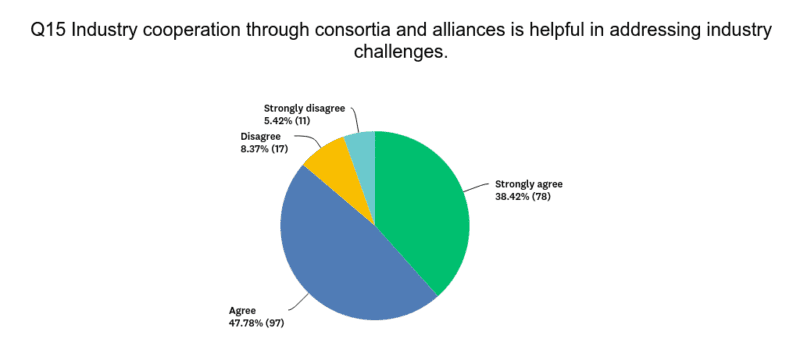In December of 2017 FindBiometrics surveyed over 200 members of its informed audience – including executives from the world’s leading biometrics companies – on topics relating to the identity technology industry over the past 12 months. The results comprise the 15th Annual FindBiometrics Year in Review.
 Of the many interesting results from FindBiometrics’ latest Year in Review, one of the most encouraging is the amount of consensus around the statement, “Industry cooperation through consortia and alliances is helpful in addressing industry challenges.” Forty-eight percent of respondents agreed, while 38 percent strongly agreed, making an overwhelming majority of 86 percent.
Of the many interesting results from FindBiometrics’ latest Year in Review, one of the most encouraging is the amount of consensus around the statement, “Industry cooperation through consortia and alliances is helpful in addressing industry challenges.” Forty-eight percent of respondents agreed, while 38 percent strongly agreed, making an overwhelming majority of 86 percent.

While it’s possible that some of this is just lip service, it’s likely that the majority of these responses reflect an acknowledgement that many biometric technologies are still in the relatively early stages of development. That means that in many cases they’re facing unique challenges such as a lack of regulatory certainty, or unfamiliarity in the mass market, or lack of standards for interoperability – all of which can make doing business difficult, even if there appears to be a lot of potential in the long term.
A great example of how working together can help to address such challenges lies in the FIDO Alliance. The consortium is focused on establishing and promoting strong authentication standards, and its certification program now supports an ecosystem of hundreds of products. OEMs and service providers are increasingly aware of the importance of having FIDO-certified products, and that in turn is helping to ensure that the products and services they’re making support easy interoperability.
For example, the latest version of the FIDO UAF standard makes it easy for developers working on Android to build support for FIDO authentication into their apps. For FIDO members offering certified or even compliant products and services, that opens up a significant opportunity for greater interoperability with mobile devices. FIDO also has growing credibility as an influential voice in policymaking when it comes to government-mandated digital security standards, which means its members have a say, too.
Meanwhile, the International Biometrics + Identity Association (IBIA) has also established a strong podium for its membership. The organization has been one of the loudest voices calling for biometric background checks for drivers in ride hailing services like Uber and Lyft, and this week it pushed back against what it called factual errors and misleading statements in an academic paper attacking the use of facial recognition for airport border screening. Like FIDO, the IBIA also has a growing roster of members that span multiple sectors, offering all of them powerful, centralized representation in sometimes contentious debates.
Of course, the IBIA and the FIDO Alliance aren’t the only industry consortia pushing the industry forward, and powerful groups are forming in areas adjacent to authentication as well, often with cross-sector cooperation: For example, last year a smart car consortium elected a Samsung executive as its leader; meanwhile, two Internet of Things alliances focused on different regions – Europe and Japan – agreed to work together to jointly promote the IoT more broadly. Like biometrics, these are relatively new technology areas, and with so much to be gained in the long term, interested parties see great benefit to working together to lay the groundwork for development.
–
January 25, 2018 – by Alex Perala







Follow Us